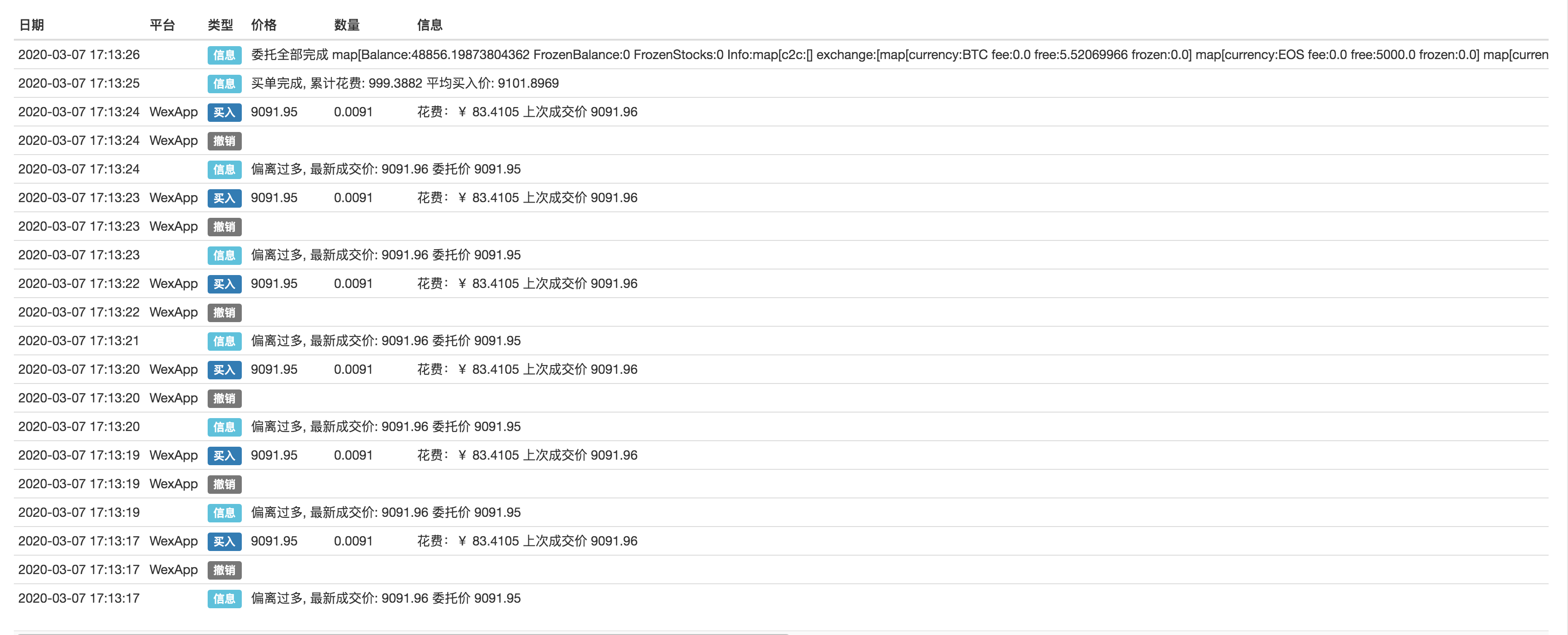Phiên bản Python chiến lược iceberg ủy ban
Tác giả:Tốt, Tạo: 2020-07-21 10:21:10, Cập nhật: 2023-10-26 20:08:29
Bài viết này đưa ra hai chiến lược cổ điển cho cấy ghép: Iceberg commission (mua / bán). Chiến lược được cấy ghép từ phiên bản JavaScript của nền tảng FMZ. Địa chỉ chiến lược làhttps://www.fmz.com/square/s:Iceberg/1
trích dẫn phiên bản JavaScript của Iceberg phần thưởng chiến lược giao dịch giới thiệu:
Iceberg commission đề cập đến thực tế là khi các nhà đầu tư thực hiện các giao dịch có giá trị lớn, để tránh tác động quá mức đến thị trường, hoa hồng lệnh lớn tự động được chia thành nhiều hoa hồng, dựa trên giá mua / bán 1 gần nhất hiện tại và giá được trader đặt. Chiến lược tự động ủy quyền một lệnh nhỏ. Khi hoa hồng cuối cùng được giao dịch hoàn toàn hoặc giá mới nhất lệch đáng kể so với giá hoa hồng hiện tại, hoạt động hoa hồng sẽ tự động bắt đầu lại.
Nhiều trang giao dịch trao đổi đi kèm với các công cụ ủy thác băng trôi, có chức năng phong phú, nhưng nếu bạn muốn tùy chỉnh một số chức năng hoặc sửa đổi một số chức năng theo nhu cầu của riêng bạn, bạn cần một công cụ linh hoạt hơn. Nền tảng FMZ được thiết kế để giải quyết vấn đề này một cách chính xác. Quảng trường chiến lược của chúng tôi không có quá nhiều chiến lược giao dịch Python. Một số thương nhân muốn sử dụng ngôn ngữ Python để viết các công cụ và chiến lược giao dịch cần tham khảo các ví dụ. Do đó, chiến lược ủy thác băng trôi cổ điển đã được chuyển sang phiên bản Python.
Ủy ban Iceberg cho Python - Mua
import random # Import random number library
def CancelPendingOrders(): # The function of CancelPendingOrders is to cancel all pending orders of the current transaction.
while True: # Loop detection, call GetOrders function to detect the current pending order, if orders is an empty array, that is, len(orders) is equal to 0, indicating that all orders have been cancelled, you can exit the function and call return to exit.
orders = _C(exchange.GetOrders)
if len(orders) == 0 :
return
for j in range(len(orders)): # Traverse the current array of pending orders, and call CancelOrder to cancel the orders one by one.
exchange.CancelOrder(orders[j]["Id"])
if j < len(orders) - 1: # Except for the last order, execute Sleep every time and let the program wait for a while to avoid canceling orders too frequently.
Sleep(Interval)
LastBuyPrice = 0 # Set a global variable to record the the latest buying price.
InitAccount = None # Set a global variable to record the initial account asset information.
def dispatch(): # Main functions of iceberg commission logic
global InitAccount, LastBuyPrice # Reference global variables
account = None # Declare a variable to record the account information obtained in real time for comparison calculation.
ticker = _C(exchange.GetTicker) # Declare a variable to record the latest market quotes.
LogStatus(_D(), "ticker:", ticker) # Output time and latest quotation in the status bar
if LastBuyPrice > 0: # When LastBuyPrice is greater than 0, that is, when the commission has started, the code in the if condition is executed.
if len(_C(exchange.GetOrders)) > 0: # Call the exchange.GetOrders function to get all current pending orders, determine that there are pending orders, and execute the code in the if condition.
if ticker["Last"] > LastBuyPrice and ((ticker["Last"] - LastBuyPrice) / LastBuyPrice) > (2 * (EntrustDepth / 100)): # Detect the degree of deviation, if the condition is triggered, execute the code in the if, and cancel the order.
Log("Too much deviation, the latest transaction price:", ticker["Last"], "Commission price", LastBuyPrice)
CancelPendingOrders()
else :
return True
else : # If there is no pending order, it proves that the order is completely filled.
account = _C(exchange.GetAccount) # Get current account asset information.
Log("The buying order is completed, the cumulative cost:", _N(InitAccount["Balance"] - account["Balance"]), "Average buying price:", _N((InitAccount["Balance"] - account["Balance"]) / (account["Stocks"] - InitAccount["Stocks"]))) # Print transaction information.
LastBuyPrice = 0 # Reset LastBuyPrice to 0
BuyPrice = _N(ticker["Buy"] * (1 - EntrustDepth / 100)) # Calculate the price of pending orders based on current market conditions and parameters.
if BuyPrice > MaxBuyPrice: # Determine whether the maximum price set by the parameter is exceeded
return True
if not account: # If account is null, execute the code in the if statement to retrieve the current asset information and copy it to account
account = _C(exchange.GetAccount)
if (InitAccount["Balance"] - account["Balance"]) >= TotalBuyNet: # Determine whether the total amount of money spent on buying exceeds the parameter setting.
return False
RandomAvgBuyOnce = (AvgBuyOnce * ((100.0 - FloatPoint) / 100.0)) + (((FloatPoint * 2) / 100.0) * AvgBuyOnce * random.random()) # random number 0~1
UsedMoney = min(account["Balance"], RandomAvgBuyOnce, TotalBuyNet - (InitAccount["Balance"] - account["Balance"]))
BuyAmount = _N(UsedMoney / BuyPrice) # Calculate the buying quantity
if BuyAmount < MinStock: # Determine whether the buying quantity is less than the minimum buying quantity limit on the parameter.
return False
LastBuyPrice = BuyPrice # Record the price of this order and assign it to LastBuyPrice
exchange.Buy(BuyPrice, BuyAmount, "spend:¥", _N(UsedMoney), "Last transaction price", ticker["Last"]) # Place orders
return True
def main():
global LoopInterval, InitAccount # Refer to LoopInterval, InitAccount global variables
CancelPendingOrders() # Cancel all pending orders when starting to run
InitAccount = _C(exchange.GetAccount) # Account assets at the beginning of the initial record
Log(InitAccount) # Print initial account information
if InitAccount["Balance"] < TotalBuyNet: # If the initial assets are insufficient, an error will be thrown and the program will stop
raise Exception("Insufficient account balance")
LoopInterval = max(LoopInterval, 1) # Set LoopInterval to at least 1
while dispatch(): # The main loop, the iceberg commission logic function dispatch is called continuously, and the loop stops when the dispatch function returns false.
Sleep(LoopInterval * 1000) # Pause each cycle to control the polling frequency.
Log("委托全部完成", _C(exchange.GetAccount)) # When the loop execution jumps out, the current account asset information is printed.
Ủy ban Iceberg cho Python - Bán
Lý thuyết chiến lược giống như mua, chỉ có một sự khác biệt nhỏ.
import random
def CancelPendingOrders():
while True:
orders = _C(exchange.GetOrders)
if len(orders) == 0:
return
for j in range(len(orders)):
exchange.CancelOrder(orders[j]["Id"])
if j < len(orders) - 1:
Sleep(Interval)
LastSellPrice = 0
InitAccount = None
def dispatch():
global LastSellPrice, InitAccount
account = None
ticker = _C(exchange.GetTicker)
LogStatus(_D(), "ticker:", ticker)
if LastSellPrice > 0:
if len(_C(exchange.GetOrders)) > 0:
if ticker["Last"] < LastSellPrice and ((LastSellPrice - ticker["Last"]) / ticker["Last"]) > (2 * (EntrustDepth / 100)):
Log("Too much deviation, the latest transaction price:", ticker["Last"], "Commission price", LastSellPrice)
CancelPendingOrders()
else :
return True
else :
account = _C(exchange.GetAccount)
Log("The buy order is completed, and the accumulated selling:", _N(InitAccount["Stocks"] - account["Stocks"]), "Average selling price:", _N((account["Balance"] - InitAccount["Balance"]) / (InitAccount["Stocks"] - account["Stocks"])))
LastSellPrice = 0
SellPrice = _N(ticker["Sell"] * (1 + EntrustDepth / 100))
if SellPrice < MinSellPrice:
return True
if not account:
account = _C(exchange.GetAccount)
if (InitAccount["Stocks"] - account["Stocks"]) >= TotalSellStocks:
return False
RandomAvgSellOnce = (AvgSellOnce * ((100.0 - FloatPoint) / 100.0)) + (((FloatPoint * 2) / 100.0) * AvgSellOnce * random.random())
SellAmount = min(TotalSellStocks - (InitAccount["Stocks"] - account["Stocks"]), RandomAvgSellOnce)
if SellAmount < MinStock:
return False
LastSellPrice = SellPrice
exchange.Sell(SellPrice, SellAmount, "Last transaction price", ticker["Last"])
return True
def main():
global InitAccount, LoopInterval
CancelPendingOrders()
InitAccount = _C(exchange.GetAccount)
Log(InitAccount)
if InitAccount["Stocks"] < TotalSellStocks:
raise Exception("Insufficient account currency")
LoopInterval = max(LoopInterval, 1)
while dispatch():
Sleep(LoopInterval)
Log("All commissioned", _C(exchange.GetAccount))
Hoạt động chiến lược
Sử dụng WexApp để mô phỏng thử nghiệm trao đổi:
Mua:

Bán:

Khái niệm chiến lược không phức tạp. Khi chiến lược được thực hiện, nó sẽ động đặt và hủy lệnh dựa trên các tham số chiến lược và giá thị trường hiện tại. Khi số lượng giao dịch / số tiền xu đạt hoặc tiếp cận số thiết lập tham số, chiến lược dừng lại. Mã chiến lược rất đơn giản và phù hợp cho người mới bắt đầu. Người đọc quan tâm có thể sửa đổi nó và thiết kế một chiến lược phù hợp với phong cách giao dịch của họ.
- Thực hành định lượng của DEX Exchange (2) -- Hướng dẫn người dùng Hyperliquid
- DEX giao dịch định lượng thực hành ((2) -- Hyperliquid sử dụng hướng dẫn
- Thực hành định lượng của DEX Exchange (1) -- dYdX v4 User Guide
- Giới thiệu về trọng tài lead-lag trong tiền điện tử (3)
- DEX giao dịch định lượng thực hành ((1) -- dYdX v4 hướng dẫn sử dụng
- Giới thiệu về bộ phận Lead-Lag trong tiền kỹ thuật số (3)
- Giới thiệu về Trọng tài Lead-Lag trong Cryptocurrency (2)
- Giới thiệu về bộ phận Lead-Lag trong tiền kỹ thuật số (2)
- Thảo luận về tiếp nhận tín hiệu bên ngoài của nền tảng FMZ: Một giải pháp hoàn chỉnh để tiếp nhận tín hiệu với dịch vụ Http tích hợp trong chiến lược
- Phân tích nhận tín hiệu bên ngoài nền tảng FMZ: Chiến lược xây dựng dịch vụ HTTP để nhận tín hiệu
- Giới thiệu về Trọng tài Lead-Lag trong Cryptocurrency (1)
- Thêm một đồng hồ báo thức vào chiến lược giao dịch
- Chiến lược bảo hiểm hợp đồng tương lai OKEX bằng cách sử dụng C++
- Chiến lược giao dịch dựa trên dòng tiền hoạt động
- Sử dụng giao dịch đầu cuối plug-in để tạo điều kiện giao dịch thủ công
- Chiến lược giao dịch tỷ lệ đánh máy định lượng
- Chiến lược cân bằng và chiến lược lưới điện
- Giải pháp chia sẻ báo giá thị trường đa robot
- Robot WeChat chương trình thực hiện tin nhắn đẩy
- Chiến lược cân bằng và chiến lược lưới chi tiết
- Chiến lược giao dịch Martingale đồ họa
- Logic của giao dịch tương lai tiền điện tử
- Hình dạng dưới cùng của chiến lược ZDZB
- Giải pháp chia sẻ thị trường đa robot
- Mô hình hóa và phân tích tỷ lệ biến động Bitcoin dựa trên mô hình ARMA-EGARCH
- Giải pháp cho vấn đề tính toán số chính xác trong thiết kế chiến lược JavaScript
- Dạy bạn để đóng gói một chiến lược Python vào một tập tin địa phương
- Giao dịch FMEX mở khóa tối ưu hóa khối lượng đơn đặt hàng Phần 2
- Giao dịch FMEX mở khóa tối ưu hóa khối lượng đơn đặt hàng
- Phân tích và thực hiện các hợp đồng tương lai hàng hóa Biểu đồ dấu chân khối lượng
- FMEX sắp xếp mở khóa tối ưu tối ưu hóa đơn hàng